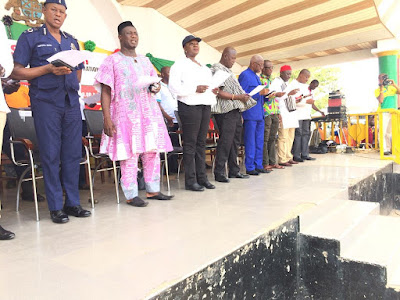YOU WILL RECEIVE BOTH LUMP SUM AND MONTHLY PENSION – REGIONAL MINISTER 1st May, 2019
Ghanaian workers and for that matter, pensioners will from
year 2020, begin to benefit pensions using the Annuity Factor. The Annuity
Factor is a method used to determine how much money can be withdrawn early from
retirement accounts before incurring penalties. The calculation primarily uses
life-expectancy data and is applied to annuities and individual retirement
accounts.
Upper East Regional Minister, Hon. Paulina Patience Abayage
announced this in her address at the regional celebration of the 2019 edition
of Workers Day held in Bolgatanga under the theme, “Sustainable Pensions for
all: The Role of Social Partners”. The event which is international in character,
is also widely known as May Day and is celebrated annually on 1st
May to recognise the valuable contributions of workers both in the formal and
informal sectors, to the development of their nations.
 |
| UE Reg. Min., Hon. Paulina P. Abayage [3rd from left] joins in singing the workers' anthem |
The Regional Minister added that, under the new method for
the payment of pensions, a pensioner would receive the lump sum from his or her
fund managers while the Social Security and National Insurance Trust [SSNIT],
pays the monthly pension benefit. She noted that aside the mandatory SSNIT
contributions, it was imperative for workers to take up the responsibility of activating
additional investment schemes that were prudent enough to help cushion them
during their lives after active employment so as not to be overtaken by events.
Hon. Abayage also observed that, “every country’s growth and
development depends largely on the quality, effectiveness and efficiency of its
labour force” and stated that, she saw all these qualities in the Ghanaian
labour force. She therefore urged the labour front to continue doing their very
best in their various assigned jobs as Government would continue to engage
leadership of the various labour unions for mutually beneficial discussions
regarding wages and better conditions of service.
The Minister who preceded her address with her own rendition
of the popular Ghanaian song “Oman Be Ye Yie”, which calls on the Ghanaian to
devote time and resources to the development of the motherland, remarked that
successive governments had depended on the Ghanaian work force to develop the country
through to this date. According to her, Government as a result gives high
priority to issues relating to labour and would do everything to ensure that,
labour got whatever was due be it wages, allowances or compensations.
Madam Abayage herself, a former labour union leader, said
pension schemes in Ghana had evolved over the years since the colonial era and
stressed that, there will be the need to continue revising the notes on
pensions in as far as times and events keep changing. She recalled that the
first pension scheme was introduced in Ghana in 1946, then came the CAP 30
scheme in the 1950s and 1960s and this was followed by the Social Security Act
of 1965 leading to the establishment of SSNIT in 1972. She noted that all these
changes were premised on the fact that, governments over the years, wanted to
expand the coverage of the schemes and also, improve the entitlements of
retirees.
Subsequently in 2007, government through engagements with
critical stakeholders, came up with yet another revised scheme with an
all-encompassing objective that was to among other things, provide better
coverage in retirement while extending taking on board, informal sector
workers. As a result therefore, the National Pension Act 2008 came into being.
It is otherwise referred to as the Three-Tier Pension and regulated by the
National Pensions Regulatory Authority [NPRA].
 |
| A section of workers at the event |
Madam Abayage explained that, the Tier Two for instance is a
work-based pension scheme, mandatory for all employees but is privately managed
to provide a lump sum to contributions upon retirement. Meanwhile, the
third-tier was the newest addition and provides for a voluntary provident fund
and personal pension scheme with tax benefits for employees who decide to
contribute for their pension beyond what the law mandates.
She said she was aware that, organised labour has raised
issues with portions of the schemes, sustainability and the method used by
SSNIT for the computation, but pledged that appropriate remedies were being
sought by the stakeholders. “I know government is working with SSNIT and the
NPRA to resolve all issues concerning pensions including the unification of all
schemes in Ghana”, the Minister stated.
Upper East Regional Secretary of the Trades Union Congress
[TUC], Mr. Augustine Apambila read a speech on behalf of the TUC
Secretary-General and noted that several thousands of workers today were paid
salaries below the National Minimum Wage which is pegged at 270.00 Ghana Cedis
per month. He added that several thousands more had been working as casual
employees without employment contracts among many other labour infractions.
According to Mr. Apambila, these unfair labour practices were
being perpetuated owing to the fact some employers know too well that state
institutions such as the Labour Commission, Factories Inspectorate Department
and the Labour Department, vested with the authority to check on such bad
deeds, were under-resourced and thus, incapacitated to execute their mandate.
He thus appealed to government to take drastic steps to equip these agencies
with the required logistics, financial and human resources so as to effectively
carry out their work to the relief of the Ghanaian worker.
 |
| Workers displaying placards |
Before converging at the Bolgatanga Jubilee Park for the
celebration-proper, several hundreds of workers and labour union members took a
march through some principal streets of the regional capital, Bolgatanga waving
placards some of which read; “Pay Us Sustainable Salary”, “Retirement Is
Inevitable, Plan Today”, “Employers In The Informal Sector Should Pay SSNIT For
Their Employees” and “GWCL – Lets Preserve Our Water Bodies” among others.
The last May Day celebration in the Upper East Region, the
2018 edition was hosted by the Bongo District.


.jpeg)
Comments